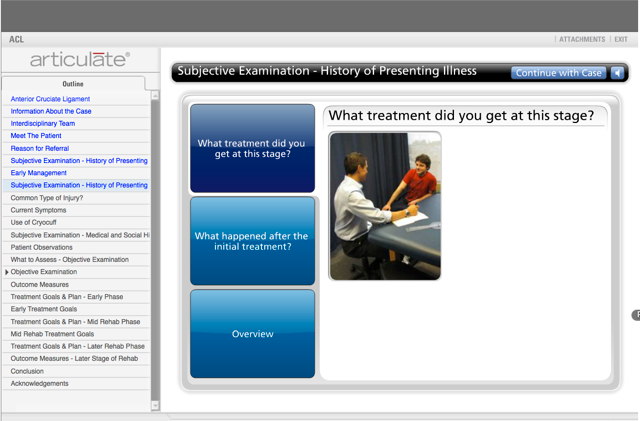Joseph Anthony has an interesting job with the UBC Faculty of Medicine – he facilitates the use of technology for educational purposes in the health professions. It’s a role that has allowed Anthony and other faculty staff to entwine video, drama and education into an array of engaging, interactive computer-based learning experiences focused around virtual patients (VP).
For years, health professions students studied paper-based patient cases. Students read about Patient X’s various health conditions and were expected to provide clinical recommendations and expertise based on the information provided. However, in 2011, that all changed when a group of internationally educated physical therapists studying at UBC to become licensed in Canada expressed a desire for more case based learning, spurring the innovative concept of using virtual patients for this task.
“Research has shown that there’s more learning retention with virtual case studies,” explains Anthony. “By developing a forum for students to apply knowledge to clinical problems in an interactive manner, we’ve transformed traditional patient case studies into a virtual clinical experience that’s both fascinating and educationally fulfilling.”
Following requests from the internationally educated therapists, UBC obtained funding from the Government of Canada and the B.C. Ministry of Jobs, Tourism and Innovation to develop a series of 23 VP cases in various areas of physical therapy practice, making the virtual patients available to students through Moodle. The cases rely upon both real patients and actors – UBC discovered they could elicit more empathy from learners when the virtual patients being studied were real people, rather than avatars. When the project was well received, it became clear the virtual case studies would also be a useful adjunct to learning provided to Masters of Physical Therapy students.
Creating More Virtual Patients
With the 23 cases now being extensively used for physical therapy training, UBC then took steps to expand the breadth of the project, starting with the creation of a virtual mental health patient case study for the Occupational Science and Occupational Therapy department. Several other virtual patient cases are also set to go live this spring including:
- a VP case study for use in the faculty’s Midwifery division;
- six cases based on the social determinants of health – issues such as poverty, age, and access to healthcare – for medicine, nursing, dentistry, physical therapy, pharmacy, and population and public health students; and
- eight additional cases for Masters of Physical Therapy students which are centred on leadership and professional issues.
The faculty’s relationship with BCcampus emerged from a need to host the virtual patient studies, but it’s recently blossomed thanks to the BCcampus online program development fund (OPDF). UBC is dedicating OPDF funding to the development of six virtual patient cases that will teach health professions students across four campuses – UBC, BCIT, Thompson Rivers University and UNBC – about healthcare issues facing indigenous populations. The VP cases will be made available via Moodle over the next 18 months.

